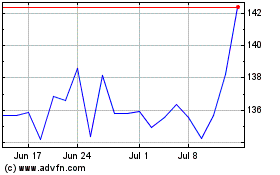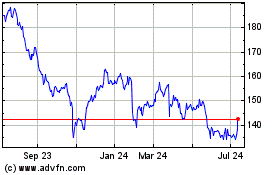YRC CEO: Focusing On Main Trucking Market After Paring Operations
May 03 2012 - 12:10PM
Dow Jones News
YRC Worldwide Inc. (YRCW) has largely finished pruning its
business lines and now has a "laser-like" focus on improving its
core North American operations, James Welch, chief executive of the
struggling trucking company, said Thursday.
"We're pretty much set now, and it's pretty much executing and
making the business better," Welch said in a post-earnings
interview. "We like what we have right now."
Welch, a trucking-industry veteran who left YRC in 2007 but who
returned as CEO last July, has been concentrating the company on
its big less-than-truckload operations. In December, he sold off
YRC's Glen Moore truckload business and, in March, he sold its
stake in Shanghai Jiayu Logistics, a Chinese logistics firm.
Less-than-truckload carriers consolidate loads from multiple
customers onto single trucks.
YRC still provides some freight-forwarding services in China
through its JHJ International Transportation joint venture. Welch
declined to discuss his plans for the unit--saying that commenting
on it would be "too forward-looking"--but he made clear that YRC's
priority is on the North American less-than-truckload market.
The company, based on Overland Park, Kan., showed improvement in
the market during the first quarter, with tonnage per day in its
main less-than-truckload freight division up 3.5%, outpacing a 1.5%
gain by rival Con-way Inc.'s (CNW) freight division and a 2.3%
decline in shipments per day at United Parcel Service Inc.'s (UPS)
freight division.
Still, some of YRC's volume gains appeared to come at the
expense of pricing. Con-way and UPS improved their yields--or
revenue per hundredweight, a broad measure of pricing--by 6.1% and
4.5%, respectively, during the first quarter, compared with a 3.3%
rise at YRC's freight division.
Welch acknowledged Thursday that "the yield on our business is
not as good as what we want," and he said YRC is working to improve
service levels so that it is better able to raise prices by
demonstrating value to customers. He dismissed the notion that YRC
intentionally used price to gain volume.
"We are not out in the marketplace overreaching," he said.
"We're trying to win business, but we're trying to win it on value,
not on price."
Welch described the overall economy as "steady," echoing
comments from Con-way executives earlier this week.
YRC shares were off 2.6%, or 19 cents, at $7.19 in recent
trading.
The company reported a narrower first-quarter loss Thursday as
its revenue improved. It lost $85.5 million, or $12.40 a share, in
the quarter, compared with a year-earlier net loss of $102.2
million, or $643.56 a share. The company's 1-for-300 reverse stock
split went into effect Dec. 1. Revenue rose 6.4% to $1.19
billion.
Analysts polled by Thomson Reuters had projected a per-share
loss of $10.42 and revenue of $1.19 billion.
Debt-laden YRC has been fending off a bankruptcy-protection
filing since late 2009. On Monday, YRC won an agreement from
creditors to relax terms on some loans, giving it more breathing
space to concentrate on improving its operations.
Despite significant downsizing over the past few years, YRC
remains the largest operator in the domestic less-than-truckload
sector, with 15.5% of the market based on 2011 revenue, according
to SJ Consulting Group, just ahead of FedEx Corp.'s (FDX) freight
division.
YRC employed about 32,000 people at the end 2011--about 25,000
of them members of the Teamsters union--little more than half its
workforce at the end of 2007.
-By Bob Sechler, Dow Jones Newswires; 512-258-1690;
bob.sechler@dowjones.com
--Nathalie Tadena contributed to this article.
United Parcel Service (NYSE:UPS)
Historical Stock Chart
From Mar 2024 to Apr 2024

United Parcel Service (NYSE:UPS)
Historical Stock Chart
From Apr 2023 to Apr 2024
